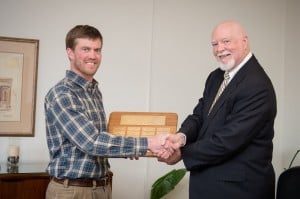
If you enjoyed the project management course, you will really enjoy THE Project 2014 competition. Each year student teams compete by developing a project plan for a specific case study. The competition is sponsored by the West Michigan Chapter of the Project Management Institute (WMPMI). This is the third year of the competition and the number of schools participating as well as teams is expected to increase. There is an opportunity to win a part of the $10,000 prize money too. First place team receives $5,000, second place receives $3,000, and third receives $2,000. In last year’s competition, Michigan Tech’s two teams placed 2nd and 3rd place! We hope to field more winning teams this year.
If you have completed a project management course and are interested in participating, you will need to contact Dr. Dana Johnson dana@mtu.edu before October 1, 2013. You will then be given approval to enroll in OSM4200 Advanced Project Management for Spring 2014. The course meets by arrangement. There is a maximum of three teams with up to six members each so sign up early. More information about the competition can be found here.
If you would like to talk to past team members, there are a few here at Michigan Tech. These students can share with you their experiences of working with PMI certified mentors, opportunities with companies for internships and/or career options, and the great hands on experience. It looks good on your resume too.
This year’s case is based on mergers and acquisitions of health care organizations and was written by Dr. Johnson the faculty advisor. Interested in learning more??? Please contact Dr. Johnson at dana@mtu.edu .
THE Project 2014
The Western Michigan Chapter of the Project Management Institute (WMPMI) is currently in the preparation stages of their 3rd Annual Collegiate Project Management Competition… “THE Project 2014.”
Purpose
To develop young business leaders by partnering college students, community leaders, and Project Management Professionals to competitively tackle a commonly shared business challenge.
Opportunity
Teams will develop a proposal, strategy, approach and plan that could be used to develop a product, service or result. Teams will be judged on their use of proper project management techniques. Team members will enjoy the benefits of working on a real life business challenge with a Project Management Professional Mentor. Teams will compete for a financial reward and recognition.
Fun facts
- Each collegiate team will consist of 4 – 6 students
- Each collegiate team will consist of no more than 50% graduate level students
- Each collegiate team will need to have the names of their team members delivered to the PMI Education Council by no later than November 1st, 2013
- Each collegiate team will have a “Mentor” assigned by the PMI Education Council. A Mentor is a Project Management Professional (PMP) certified in the many disciplines of Project Management and they’ll meet with the team and Team Champion on a regular basis to mentor them through the competition deliverables
- Each collegiate team will have at least 1, no more than 2 “Team Champion(s).” A Team Champion is a school official (usually faculty member or department head) that meets with the team on a semi-regular basis to help motivate and support the work of the team and the Mentor
- Knowledge in or pursuit of a program of study in Business, Engineering or Project Management is not a requirement but will be helpful in completing various competition deliverables as well as having students studying varying backgrounds like Finance, Human Resources, Business, Sociology, etc.
- Each educational institution will be allowed to enter a maximum of 2 teams into the competition
- There is no cost to any students or the educational institution to participate (other than coordinating travel to Grand Rapids on the final event day in April 2014)
- The winning team in the competition receives $5,000 to split between its members however all top 4 finishing teams will receive some form of monetary reward for their success
- The winning team will also have an opportunity to present their project plans at a West Michigan Chapter of PMI dinner meeting
All competitors will participate in a day-long final event where:
- a Reverse Career-Fair will take place involving all the sponsor and partner companies (over half of our competitors in previous years have ended up with an internship or job offer)
- each team will present their final presentations to a panel of leading project management professionals for the first round of judging and the top four teams will then present to a panel of prominent business leaders for final judging
Students will. . .
- Receive an intern like opportunity in Project Management
- Experience a great opportunity to work on real business problems and create a real project plan for the business
- Enjoy a networking opportunity to interact with local business leaders
- Gain real world opportunity to showcase leadership and interpersonal skills
- Represent their school in a collegiate competition
- Develop career focused skills which will translate to career opportunities
- Participate in “hands-on” learning in a team environment
Below are three videos from the PMI website that are great:
Governor Snyder’s Greeting (his personal address to participants in last year’s competition)
West Michigan Week Video – Aired April 2013 (on WGVU News)
THE Project Vision Video (THE Project from an internal perspective)
*The West Michigan Chapter of the Project Management Institute (WMPMI) started planning a collegiate Project Management competition in 2011 for students in various business, engineering and project management content areas. The students competed for a cash prize and in some cases received college credit (this is dependent entirely on the awarding institution… i.e. policies regarding Prior Learning Assessment Credit or ability to implement content material into curriculum). The biggest benefit for the students was the networking they were able to do and the exposure they received to various local businesses and leaders so they might secure internships and jobs once they graduate. This event has grown in size and popularity and is now an annual event that WMPMI looks forward to every year.



